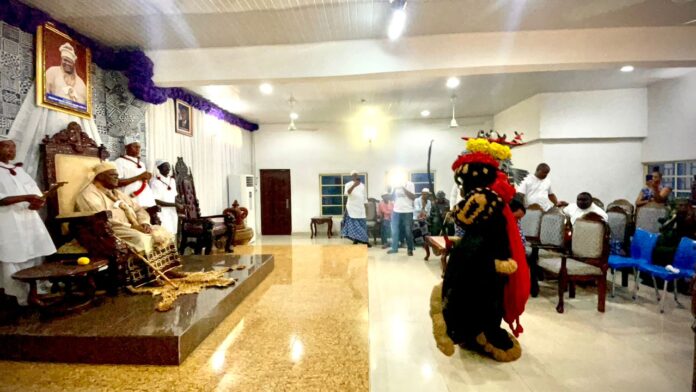EFIK! LET’S REASON TOGETHER: IS IT BETTER SAID-“ỌBỌÑ OKPỌNO EBEFA , EBEFA OKPONO ỌBỌÑ” OR “ỌBỌÑ OTOMO EBEFA, EBEFA OTOMO ỌBỌÑ”… OR WHAT?© Holyns Hogan, 2023
PREAMBLE
The reason for this post is simply because it is mainly intended to educate its global readers against suspected doubts about the real meanings, original applications or forms of the phrases [considered] for discussion in the subject, Forenote that considered phrases respectively suggests the Efik’s equivalence of English’s “RESPECT IS RECIPROCAL”.
1. ỌBỌÑ OKPỌNO EBEFA, EBEFA OKPONO ỌBỌÑ
This directly or loosely translates to the king (Ọbọñ) worships/respects (okpono) the commoner (Ebefa) and vice-versa. Note that Ebefa extends to broadly but precisely cover royal servers, courtiers, ordinary people/sundry subjects/non-royal masses, particularly those found within the king’s territory or monarchy.
A critical review of this phrase (1) and its lexical Implications reveals that it must firstly and ironically [but illogically] take the king, a sovereign, treated as a deity/demi-god in most global societies to command/earn his deserved natural and traditional respect [in reciprocity] from his subject (s). This, though right in ordinary human relationship where mutual relationship, dependence, action or influence is needed for exchange or shared commercial, military, political, technological or cultural privileges/alliances as seen in the European Union, NATO, UN-Security Council allies-setting and current US trilateral tie with South Korea and China, is critically, naturally, politically /culturally wrong where a king-as aforedefined- is involved.
2. ỌBỌÑ OTOMO EBEFA, EBEFA OTOMO ỌBỌÑ
This directly or loosely translates to the king honours (not pays homage to) his subject or commoner and vice-versa. Here, even though the lexical structure/words- framing appears critically questionable as is the case in (1) above, it still has hiden truth in the logic that a good or benevolent king could thro charity, altruism/merit decide to voluntarily honour his choice subject, server or commoner with public recognition, promotion, financial, material or social reward, depending, however on his degree of tested and trusted loyalty, patriotism or diligence in the honour, worship or appeasement of the king/suppọrt to the kingdom’s growth in general.
Main example are as often seen in instances where the king public invites to state royal banquets, people who ordinarily are non-royals or naturally considered unfit to sit, dine or wine with the king. Also, where kings of high reputes like Charles of England, Ọba of Benin, Ooni of Ife, Sultan of Sokoto and Ọbọñ of Calabar etc. happily or publicly embrace, closely blessed or invite for special handshake or honorary chieftaincy title, their beloved, deserving or distinguished subjects. Of course, it is often in this context that the Efik equally say, “Eyenọwọñ eyet ubọk asana, adia udia ye akwa owo/Ọbọñ, translated to- A child that washes his hand clean, dines with the elder/king. Little Asari Dokubu, a pọpular Niger-Delta militants head recently got the honour of being [un]officially to visit and dialogue with Nigeria’s President Bola Ahmed Tinubu in ASO ROCK VILLA, Nigeria’s official state house.
3. WHAT THEN IS CONTEXTUALLY THE APPROPRIATE THING TO SAY?
The most appropriate thing to say or recommended in the correct lexical order [by this author] is contextually- EBEFA OTOMO ỌBỌÑ, ỌBỌÑ OTOMO EBEFA (Not the other way round).
JUSTIFICATION
Tomo (as afore-implied) is Efik homonym for homage, honour or recognition inspired by status, loyalty or acknowledgement that is lawfully, ethically, socially, politically, naturally or culturally earned by merit as king, commoner, deity or society person/group. Example, we can tomo Abasi (pay homage to God) through the special annual thanksgiving services and offerings of worships, praises, material or financial donations made yearly in churches, temples and/or shrines to Him, including to religious priests, oracles or kings in theocracy or monarchy, in acknowledgement of His status as God, giver of life, source of divine safety and blessings etc. We can also tomo the different [con]fraternities we belong to as Nka …by their approved slogans. Eg. Oye Bap Ekpe [Oweh!], tomo idem (when we openly boast about self or appear to arrogantly say things that draw or centre all attention/praises on us), tomo ufọk etc.
However, care must be taken to note that TOMO as used in the case of an Ọbọñ to Ebefa is never seen and/or interpreted as homage but as honour earned for appeasing the king via recognised loyalty, diligence or state service as already implied or alluded to above. Further contextually note that Ebefa only deserves an Ọbọñ’s recognition or honour/respect when he/ she has first distinguished him/herself through a recognised state service, loyalty, diligence or homage to the king/kingdom. Therefore, it is in this author’s rightful authoritative conclusion that, it is contextually and critically illogical, unethical, socially, politically and/or culturally wrong and disrespectful for Ọbọñ to precede Ebefa in a saying that suggests homage, honour or respect reciprocity between Ebefa (subject/commoner) and Ọbọñ (King).
HAVE YOUR SAY!









